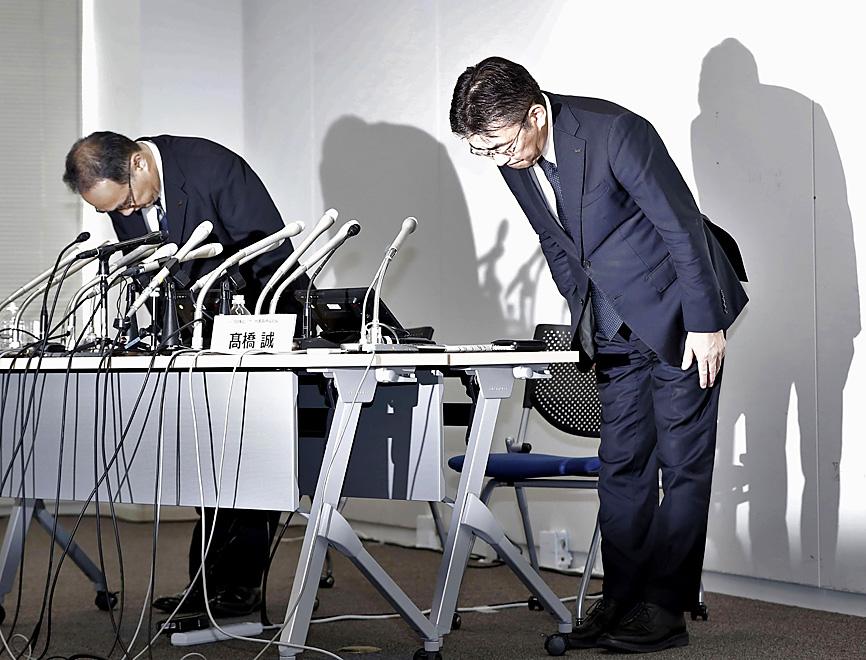Japan’s second-largest mobile carrier by subscribers fell in Tokyo trading after a nationwide disruption of its services over the weekend.
As many as 39 million mobile lines were affected, preventing users from making calls or using data services, until the network was almost fully restored yesterday afternoon.
KDDI Corp, in an unusually large swing for a typically stable stock, dropped as much as 3.9 percent, its biggest intraday fall since March 30. Shares pared their losses by the close, falling 1.7 percent, but still trailed the TOPIX’s 1.3 percent gain.

Photo: AP
The network disruption began early on Saturday and affected KDDI users nationwide as well as other platforms using the carrier’s network, such as weather services, parcel deliveries and ATMs.
Rakuten Mobile, operated by e-commerce company Rakuten Group Inc, said its users were also affected.
Voice and data transmission have been almost fully restored as of 4pm, KDDI said.
“We deeply regret what happened, as a telecommunications company that should provide a stable service and support social infrastructure,” KDDI president Makoto Takahashi said at a news briefing on Sunday, local broadcaster NHK reported. “We’re doing our best on recovery efforts.”
This is not the first time Japan has suffered significant mobile network problems. NTT Docomo Inc reported an outage in October last year that disrupted phone and data communications services nationwide. The government told NTT Docomo in November to improve operations following the incident.
The incident is “very regrettable,” Japanese Minister of Internal Affairs and Communications Yasushi Kaneko told a news conference on Sunday.
KDDI should take drastic measures to prevent any recurrence, he said.
The Ministry of Internal Affairs and Communications is considering issuing administrative guidance, the Asahi Shimbun reported, without attribution.
“This will have a negative impact on share prices in the short term,” Mitsubishi UFJ Morgan Stanley analyst Hideaki Tanaka wrote in a report after the KDDI disruption. “But this is a risk that all major carriers have. I don’t think this will cause major changes to the number of subscribers.”

MULTIFACETED: A task force has analyzed possible scenarios and created responses to assist domestic industries in dealing with US tariffs, the economics minister said The Executive Yuan is tomorrow to announce countermeasures to US President Donald Trump’s planned reciprocal tariffs, although the details of the plan would not be made public until Monday next week, Minister of Economic Affairs J.W. Kuo (郭智輝) said yesterday. The Cabinet established an economic and trade task force in November last year to deal with US trade and tariff related issues, Kuo told reporters outside the legislature in Taipei. The task force has been analyzing and evaluating all kinds of scenarios to identify suitable responses and determine how best to assist domestic industries in managing the effects of Trump’s tariffs, he

TIGHT-LIPPED: UMC said it had no merger plans at the moment, after Nikkei Asia reported that the firm and GlobalFoundries were considering restarting merger talks United Microelectronics Corp (UMC, 聯電), the world’s No. 4 contract chipmaker, yesterday launched a new US$5 billion 12-inch chip factory in Singapore as part of its latest effort to diversify its manufacturing footprint amid growing geopolitical risks. The new factory, adjacent to UMC’s existing Singapore fab in the Pasir Res Wafer Fab Park, is scheduled to enter volume production next year, utilizing mature 22-nanometer and 28-nanometer process technologies, UMC said in a statement. The company plans to invest US$5 billion during the first phase of the new fab, which would have an installed capacity of 30,000 12-inch wafers per month, it said. The

Taiwan’s official purchasing managers’ index (PMI) last month rose 0.2 percentage points to 54.2, in a second consecutive month of expansion, thanks to front-loading demand intended to avoid potential US tariff hikes, the Chung-Hua Institution for Economic Research (CIER, 中華經濟研究院) said yesterday. While short-term demand appeared robust, uncertainties rose due to US President Donald Trump’s unpredictable trade policy, CIER president Lien Hsien-ming (連賢明) told a news conference in Taipei. Taiwan’s economy this year would be characterized by high-level fluctuations and the volatility would be wilder than most expect, Lien said Demand for electronics, particularly semiconductors, continues to benefit from US technology giants’ effort

‘SWASTICAR’: Tesla CEO Elon Musk’s close association with Donald Trump has prompted opponents to brand him a ‘Nazi’ and resulted in a dramatic drop in sales Demonstrators descended on Tesla Inc dealerships across the US, and in Europe and Canada on Saturday to protest company chief Elon Musk, who has amassed extraordinary power as a top adviser to US President Donald Trump. Waving signs with messages such as “Musk is stealing our money” and “Reclaim our country,” the protests largely took place peacefully following fiery episodes of vandalism on Tesla vehicles, dealerships and other facilities in recent weeks that US officials have denounced as terrorism. Hundreds rallied on Saturday outside the Tesla dealership in Manhattan. Some blasted Musk, the world’s richest man, while others demanded the shuttering of his